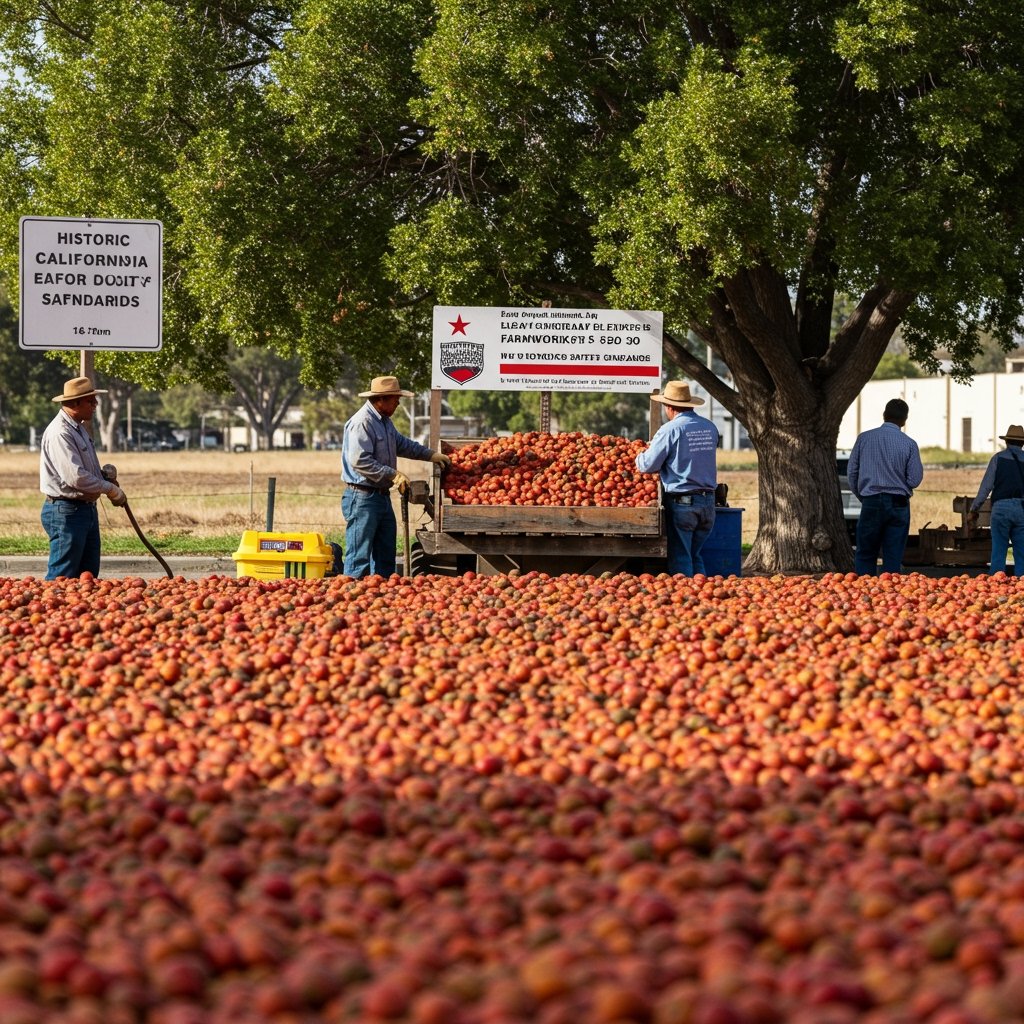California Enacts Landmark Farmworker Protection Act
Sacramento, CA – In a move poised to significantly reshape the landscape of agricultural labor in California, Governor Gavin Newsom today signed into law Assembly Bill 301, officially known as the “Farmworker Protection Act.” The comprehensive legislation introduces substantial changes aimed at improving the economic well-being and safety conditions of the state’s agricultural workforce, a sector critical to California’s economy and food supply.
The signing marks a pivotal moment for the state’s estimated 800,000 farmworkers, many of whom perform demanding labor under challenging conditions. AB 301 is designed to address long-standing concerns regarding low wages, insufficient protections against extreme weather, and overall working conditions in agricultural fields.
Key Provisions of AB 301
The Farmworker Protection Act introduces two primary, impactful changes. First, it mandates a statewide minimum wage increase specifically for agricultural workers. Effective March 1, 2025, the minimum wage for these laborers will rise to $20 per hour. This represents a significant leap from the current statewide minimum wage and is intended to provide a more livable income for farmworkers and their families.
Second, the bill establishes stricter heat illness prevention protocols for individuals engaged in outdoor agricultural labor. Recognizing the inherent risks associated with working in California’s often intense heat, particularly during warmer months, these enhanced safety measures are set to take effect starting April 1. While specific details of the stricter protocols will likely be defined through regulatory processes, they are expected to build upon existing state standards, potentially requiring more frequent mandated rest breaks, increased access to shade and cool drinking water, and improved training for supervisors and workers on recognizing and responding to heat stress symptoms.
Proponents argue these provisions are essential to protect the health and dignity of workers who are vital to bringing food to tables across the state and the nation. The $20 minimum wage is seen as a crucial step toward valuing the often-arduous labor performed by farmworkers, while the stricter heat protocols are a direct response to the very real dangers posed by climate change and rising temperatures.
Industry Concerns and Opposition
The passage of AB 301 was met with significant opposition from various agricultural organizations across California. Among the most vocal critics was the California Farm Bureau Federation. Representing a wide array of growers and ranchers, the organization voiced strong concerns about the potential financial burdens the new law would place on agricultural businesses.
Opponents argue that a mandatory $20 per hour minimum wage represents a substantial increase in labor costs, which are already a significant expense for growers. They contend that these increased costs could make California farms less competitive compared to those in other states or countries with lower labor expenses. Concerns were also raised about the potential for these costs to be passed on to consumers in the form of higher food prices, or conversely, absorbed by growers, potentially leading to reduced profitability, scaling back operations, or even closures, particularly among smaller family farms.
The California Farm Bureau Federation and its allies emphasized that while they support fair compensation for workers, the rapid increase mandated by AB 301, combined with other regulatory costs, could severely impact the economic viability of farming in the state. They highlighted the existing pressures from drought, market fluctuations, and international competition as factors that make adapting to such a significant cost increase challenging.
Advocacy and Celebration
Conversely, advocates for farmworker rights lauded the signing of AB 301 as a monumental achievement. Organizations like the United Farm Workers (UFW) celebrated the bill as a historic victory for labor rights.
The UFW and other supporting groups have long campaigned for better wages, improved working conditions, and stronger protections for farmworkers. They view the $20 per hour minimum wage as a long-overdue recognition of the essential, often dangerous, nature of agricultural work and a necessary step toward lifting workers out of poverty. The stricter heat protocols are also seen as critical to preventing illness, injury, and even death among workers who are frequently exposed to extreme temperatures without adequate safeguards.
Advocates argued that the bill corrects historical inequities and acknowledges the indispensable contribution of farmworkers to California’s economy and way of life. They countered the arguments about financial burden by emphasizing the moral imperative to ensure fair treatment and safe working conditions for those who harvest the state’s food supply. The passage of AB 301 is viewed by these groups as a testament to years of organizing, advocacy, and the enduring struggle for dignity and justice in the fields.
Broader Implications and Looking Ahead
The implementation of the Farmworker Protection Act, with its key provisions taking effect in March and April of 2025, will be closely watched. The economic impact on California’s diverse agricultural industry – from large-scale operations in the Central Valley to smaller farms in coastal regions – remains a subject of intense debate.
Experts suggest that farms may explore various strategies to mitigate increased labor costs, including investing in automation where feasible, adjusting crop mixes, or seeking higher prices for their produce. The effectiveness and enforcement of the stricter heat protocols will also be a critical area of focus, ensuring that the new rules translate into tangible safety improvements in the fields.
Governor Newsom’s signing of AB 301 solidifies California’s position at the forefront of agricultural labor policy in the United States. While challenges in implementation and potential economic adjustments are anticipated, the law fundamentally alters the legal framework governing farmworker employment, aiming to secure better pay and safer working conditions for a vital segment of the state’s workforce.


















